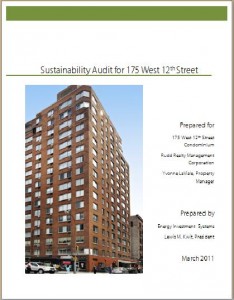Sustainability audits are a cost-effective tool to assess a building’s energy savings options. Committed to high performance and sustainable design, EIS performs comprehensive residential sustainability audits that analyze the way that client buildings use energy and at what cost. The user-friendly audits communicate effectively with owners, residents, insurers and financial institutions. Our goal is to save your building money, increase property values, improve indoor environmental quality, and seriously reduce the building’s carbon footprint. These EIS roadmaps to a sustainable future meet mandated City energy audit requirements.
Energy Analysis
EIS begins with a custom energy profile of the building that identifies consumption patterns and peak energy usage over a one-to-two year period. We review major building systems, including electrical service and lighting, heat and hot water service, windows, HVAC systems, roofs, elevators, and clean air and water, and establish the carbon footprint of the building. Apartment surveys ascertain energy use by residents and determine the penetration of Energy Star products and environmental protection features within units.
Recommendations
The EIS audit establishes a baseline of building performance. It projects potential energy savings and cost reductions through various improvements to major building systems. It reviews potential savings through alternate energy providers.
The EIS audit discusses and recommends products, equipment and methods to benefit public areas and apartments. The audit goes beyond energy issues to identify ways to enhance indoor environmental quality, including cleaner water and indoor air. EIS sustainability audits are yielding valuable energy and money saving strategies for EIS client buildings, as profiled in recent Habitat Magazine articles.
Implementation Strategy
Recognizing that a plan is only as good as its ability to be executed, EIS offers buildings strategies to implement its recommendations. Our strategic plans consider the building’s ability to finance capital costs and identify incentive programs that can assist in implementing recommended technologies and techniques.

